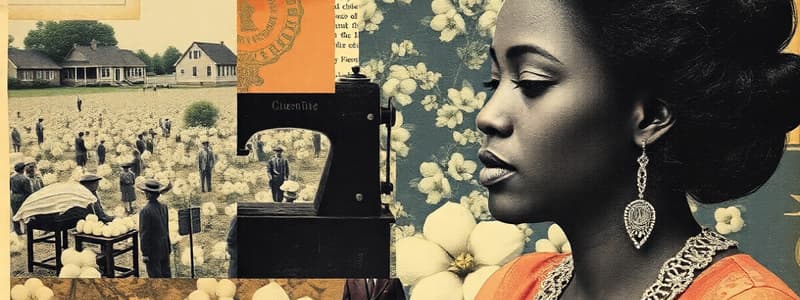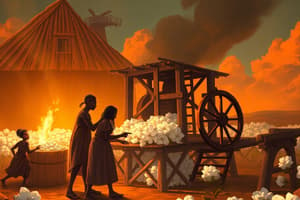Podcast
Questions and Answers
What was a key characteristic of the major books on slavery published in the 1970s?
What was a key characteristic of the major books on slavery published in the 1970s?
- They focused on first-person narratives of slaves.
- They struggled to connect slavery to modern issues.
- They analyzed slavery's impact on global economies.
- They depicted slavery primarily within the antebellum South. (correct)
Why did some Americans in the 1830s refer to slavery as 'the peculiar institution'?
Why did some Americans in the 1830s refer to slavery as 'the peculiar institution'?
- They saw it as a positive necessity for society. (correct)
- They thought slavery was a moral failing.
- They believed it was unique to the United States.
- They viewed it as a temporary condition.
What major event in U.S. history is marked by the year 1863 in relation to slavery?
What major event in U.S. history is marked by the year 1863 in relation to slavery?
- The end of slavery. (correct)
- The founding of the abolitionist movement.
- The establishment of the Underground Railroad.
- The beginning of widespread slave revolts.
What role did Margaret Mitchell's 'Gone With the Wind' play in the perception of slavery?
What role did Margaret Mitchell's 'Gone With the Wind' play in the perception of slavery?
What is one ongoing debate among historians regarding slavery?
What is one ongoing debate among historians regarding slavery?
Flashcards
Global Slavery
Global Slavery
Slavery was not just a Southern U.S. institution but had a global reach and influence.
North's Role in Slavery
North's Role in Slavery
The North had significant economic and political ties to slavery.
Nuanced View of Slavery
Nuanced View of Slavery
Historians are now examining slavery as a system with its intricate social and cultural aspects.
Cotton Gin's Impact
Cotton Gin's Impact
Signup and view all the flashcards
Gender Imbalance
Gender Imbalance
Signup and view all the flashcards
Slave Resistance
Slave Resistance
Signup and view all the flashcards
Slave Agency
Slave Agency
Signup and view all the flashcards
Master's Self-Image
Master's Self-Image
Signup and view all the flashcards
Paternalistic Control
Paternalistic Control
Signup and view all the flashcards
Antebellum South
Antebellum South
Signup and view all the flashcards
Economic Power of Cotton
Economic Power of Cotton
Signup and view all the flashcards
Slave System Norms
Slave System Norms
Signup and view all the flashcards
Power Dynamics of Slavery
Power Dynamics of Slavery
Signup and view all the flashcards
Slave Resistance Challenges
Slave Resistance Challenges
Signup and view all the flashcards
Slave Resistance Strategies
Slave Resistance Strategies
Signup and view all the flashcards
Socio-cultural Norms of Slavery
Socio-cultural Norms of Slavery
Signup and view all the flashcards
Atlantic Slave Trade
Atlantic Slave Trade
Signup and view all the flashcards
Comprehensive Understanding
Comprehensive Understanding
Signup and view all the flashcards
Redefining Slavery
Redefining Slavery
Signup and view all the flashcards
Unequal Power Dynamics
Unequal Power Dynamics
Signup and view all the flashcards
Study Notes
Slavery as a System
- The text challenges the traditional view of slavery as confined to the antebellum South.
- Historians now recognize slavery as a complex institution with a global reach.
- The economic and political influence of slavery extended beyond the southern states.
- The North's involvement in slavery was extensive through both economic ties and political policies leading up to the U.S. Civil War.
Redefining Slavery
- Historians are now incorporating a more nuanced perspective on the history of slavery, moving away from simply recognizing its abolition as a defining marker.
- New research delves into the understanding of slavery as a system with its own socio-cultural norms and power dynamics.
The Power of the Cotton Gin
- The invention of the cotton gin significantly influenced the expansion of slavery and the cotton industry in the South.
- This invention revolutionized the cotton planting and processing in the South.
Exploring the Role of Gender in Slavery
- The study of gender in slavery allows for a more comprehensive understanding of the experience of enslaved individuals.
- The Atlantic slave trade disproportionately transported men over women to the New World.
- This significant imbalance created unique social and demographic challenges for slave societies.
Exploring Resistance and Agency of Enslaved Individuals
- Examining the resistance of enslaved people is crucial to understanding their agency and survival strategies within the system.
- Some historians have argued that focusing solely on slave resistance could potentially overshadow the immense power dynamics and brutal reality of slavery.
The Master's Self-Image
- The text examines how slavery impacted the self-perception of the master class.
- The image of the master class evolved from a patriarchal model to one that emphasized paternalistic control over slaves.
- This change in self-image was partly fueled by the escalating power of cotton in the economy.
Studying That Suits You
Use AI to generate personalized quizzes and flashcards to suit your learning preferences.




